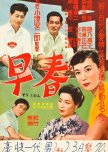
This review may contain spoilers
"Everyone's dissatisfied"
Ozu explored the family life of a cog in a wheel salaryman. Sugiyama Shoji personified the endless, hopeless life of the literally white collared worker who made just enough to live on but not enough to get ahead, much less dream of something different.Shoji and Masako have been married for a number of years but after the death of their baby son have drifted apart emotionally. Shoji's family is now primarily populated by the people he works with, ex-army buddies, and mahjong companions. Masako has a widow neighbor and a jaded mother she can turn to. Due to Shoji's nighttime habits of mahjong and drinking, the couple are behind in their rent. The disaffected worker is about to knock Ozu's ubiquitous train off the tracks when he begins an affair with a younger woman named Goldfish.
Aside from A Hen in the Wind's male lead, Shoji was one of the most unsympathetic leads in an Ozu film that I've seen so far. He frittered away the family money, barely spoke to his wife and treated her like a maid. He brought drunk friends home to sleep it off and walked out one evening when he surprisingly came home early and dinner wasn't ready yet. To top it all off he scarcely covered up his affair which seemed cruel. His wife did all the laundry and he didn't think she'd notice the lipstick faithlessly adorning his clothing? He didn't think she would smell another woman on him when he sauntered in after having sex with Goldfish? When she finally did confront him, he tried to gaslight her and lied like a five-year-old. With the exception of one woman who told her to stick to her guns, others, including her mother, convinced her to apologize for her part in the marital estrangement and go back to her husband. Thankfully, Shoji did finally apologize to her, however with all the emotional depth of apologizing to someone you'd accidentally bumped into. As the husband in Hen in the Wind did, he wrapped up the story with a "let's start all over again" happy ending. Ozu banged on about how disillusioned salarymen were and largely blaming Shoji's infidelity on his employment dissatisfaction. Where was the insight into the grief Masako was obviously still dealing with and her loneliness? Where was the compassion for a lonely woman with a husband who spent most of his time away from home? Why did she have to apologize for her husband sleeping with another woman?
Ozu's composition and framing were as exquisite as ever. There were the typical scenes in an Ozu film with singing and game playing, occasionally both at the same time. The 2 hours and 24 minutes film dragged badly in places. How many drinking and singing scenes were truly necessary? The waxing on about the meaninglessness of a salaryman's life became repetitious. Over and over again, Shoji was shown spending time with just about anyone but his wife which began to wear thin. It was doubly painful because Shoji never mentioned loving his wife whereas numerous characters commented on Masako's love for Shoji. At no point did Ozu show the reason Shoji decided to turn his marriage around other than for convenience's sake which made the decision emotionally hollow.
Ozu's insight into the long hours and drudgery of death by overwork was stinging. The commentary on women with unfaithful husbands was disheartening. The nicest comment about wives was Shoji's older friend played by Ozu regular, Ryu Chishu. "No one is more dependable than a wife." Sounds like something you would say about a brand of tires or dishwasher. I didn't find the unfaithful and cold Shoji a compelling or sympathetic character. He was an irresponsible husband who did nothing to earn his wife's forgiveness. Ozu made many meaningful films, for me, this wasn't one of them.
8/29/23
Was this review helpful to you?
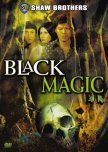
This review may contain spoilers
Watch only if you have a strong stomach
In the 1970's movies and television dug into the occult and often mixed it with a little sexploitation. Black Magic was one of those movies. The movie boasted a strong Shaw Brothers cast-Ti Lung, Lo Lieh, Tien Ni, Ku Feng and Lily Li. It also had a host of slimy creatures. You'd need a strong stomach to watch it.Ku Feng played the Black Magic magician with a laughable gray wig. Lo Lieh loved Tien Ni's money so he needed her to fall in love with him. Tien Ni was in love with Ti Lung's body and needed him to fall in love with her. Ku Feng wanted to sleep with Tien Ni. Finally, Ti Lung and Lily Li had a wholesome love that was definitely going to get messed up by all the lust and greed in the air. The Black Magic started flowing and nobody ended up with exactly what they desired. Fortunately, Ku Wen Chung played a good priest who helped sort things out by the end.
There were plenty of dead bodies, nude bodies (some writer had a fetish about women expressing breast milk), snakes, worms, centipedes and other vile bits. I'd have to include Ti Lung's horrible wig among the scary objects. The only thing that caused me to rate this as high as I did was the hilarious finale where good and evil fought it out with cheap 1970's special effects and sound effects on top of a building scaffold. I watched it on my quest to see all of Lo Lieh's movies. Other than that, I couldn't recommend unless you enjoy films with all of the above.
8/26/23
Was this review helpful to you?
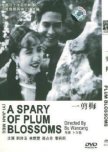
This review may contain spoilers
"One who readily falls in love can hardly be a faithful lover"
A Spray of Plum Blossoms was a modernized and loose adaption of Shakespeare's first play, The Two Gentlemen from Verona. This is one of only seven Ruan Ling Yu films readily available and while her part is relatively small, she still makes the film worth watching. The silent version I watched used Shakespeare's names for the characters and I will do the same in this review.400-year-old spoilers ahead! Valentine and Proteus are friends from military school. Proteus falls in love with Valentine's sister Julia and vows to take care of her while his friend leaves for a post at Guangzhou. Upon Valentine's arrival he falls in love with the general's daughter Silvia, who reciprocates his feelings. In time, Proteus is assigned to the same post but he doesn't leave before declaring his undying love and fidelity for Julia. Proteus arrives at the post in style via a bi-plane. Proving he truly is the General of Perfume he immediately falls in love with Silvia.
Proteus betrays his friend, causing the General to discharge and exile Valentine. Proteus has competition for Silvia in the form of Thurio, another soldier vying for her hand and the general's favor. Silvia refuses both as her heart has already been given to the disgraced Valentine. When Julia finds out that her brother is in trouble, she travels to the army post and confronts Silvia not about her brother but about Proteus. Silvia convinces her that she isn't in love with him and that he is the reason for Valentine's predicament. Silvia and Proteus take a horse ride together so that she can make him confess. He does but then tries to rape her. Thurio rescues her but has the same violent impulse that Proteus had. Fortunately, the Plum Blossom Bandit who is Valentine in disguise saves her. The next day she and Julia (who is dressed as a male soldier) are captured by bandits on a ride into the countryside. They are brought to the Plum Bandit and the women and Valentine are reconciled. Along with the bandits they set a trap for Proteus. After being confronted by Valentine he confesses his crimes and attempts to shoot himself but is thwarted by Valentine. General Sze arrives and Proteus confesses to him as well. Valentine and Proteus make up even though Proteus tried to rape his girl and had him exiled. It's implied that Proteus and Julia get back together and everyone is one big happy family.
I had hoped that this film would avoid Shakespeare's misogynistic 'bros before hoes' ending. At least Valentine didn't offer Silvia to Proteus in this film. Aside from the unsatisfying ending, I enjoyed this tale of true love, friendship, betrayal, villainy, and without earning it-reconciliation. Ruan and Jin Yan always had a nice chemistry, even if they were playing siblings. Lin Chu Chu as Silvia gave a wonderfully spirited performance as the woman who was loyal to Valentine and to her new friend Julia. It was an interesting take on the military with women leading the men and in uniform in various situations.
The existing film that I watched had been cropped. The words on the intertitles were cut off on the left and bottom. At other times, the film was damaged making it hard to read the light words. There was no music. I've watched enough silent scoreless films that the lack of music doesn't even register anymore. This film felt very ambitious compared to other silent films. Though the core cast had most of the lines there were numerous extras. Silvia's plum blossom room came across very stylistic. Aside from the military camp, the characters were filmed in what would have been beautiful, wide scenery. Silvia escaping on horse with the dastardly Thurio right behind her was exciting and well shot.
I think Shakespeare would be pleased that his play was first made into a move in 1931 and is still available nearly 100 years later. He might have had to get used to the idea of women as actresses but I think Ruan Ling Yu and Lin Chu Chu could change his mind.
8/26/23
Was this review helpful to you?
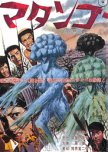
This review may contain spoilers
"This yacht will never sink, it cost a lot of money" Wanna bet?
The 1960's were a fun time for monster movies, case in point this film---Attack of the Mushroom People AKA Matango. The film boasted alums from Godzilla and Kurosawa movies, not a bad way to build a cast for a dark movie about survival on a nightmarish jungle island.For an older generation or ones who've spent time watching TVLand, see if this sounds familiar---The movie begins with a jaunty tune as seven people frolic on a yacht. A millionaire, the skipper, first mate, television star, professor, and naïve young woman become stranded on a remote island after their yacht is blown off course during a terrible storm. Gilligan didn't have a writer on his island but this island does and this first mate was far more deadly and lecherous than the Skipper's little buddy. Too bad the professor's field was psychology or maybe he could have made a phone out of mushrooms as there were no coconuts to be found.*
The survivors found another ship run aground near the island with a captain's log stating to not eat the mushrooms. Given that the mysterious ship had been studying the effects of radiation on plants and animals, it left the door open that the mushrooms on the island (mushroom cloud?) might have been a scientific disaster either theirs or someone else's. Strange, colorful fungi covered the surfaces in the rooms of the wreck. Human nature began to rear its ugly head as fear and the lack of food chafed on everyone. The class divides fractured causing friction from the top down. Money was of little use when a person was starving.
"The weak constraints of society disintegrate in the face of the will to survive in harsh circumstances."
As polite society broke down and despair prevailed, the survivors slowly succumbed to eating the mushrooms, leading to a terrible fate. We know that the professor survived for he was shown in the opening shot, confined to a psych ward. After the grim transformations of his friends and acquaintances, he was left wandering if he should have stayed on the island as Tokyo could be even more cruel.
Matango built the story slowly, focusing on the different characters and showing their strengths and slow decline as hope withered away. It was fun seeing Koizumi Hiroshi have a nice meaty role after all the Godzilla films he worked in. This film included actors from both Godzilla and Kurosawa films, as director Honda worked in both. The acting was hit or miss with the cast, but the writing for them was stronger than most Kaiju or other monster fare from the era. The story grew darker as civility slipped away with hunger and desire taking hold. The mushroom creatures were typical 1960's people in rubber suits, but disturbing enough. The music and fog set the stage for a creepy tale to unfold.
Unlike the castaways on Gilligan's island Matango's castaways were jealous, lustful and murderous, mortal sins only heightened by the psychedelic fungi. The need to drift away into hallucinations instead of fighting to survive slowly dragged most of the castaways down, transforming them into the fungal creatures. Hunger can drive a person mad but so can monstrous psychedelic mushrooms. Attack of the Mushroom People was a mind-bending study of how people behave when societal norms collapse and when they lose the will to fight or even live.
8/24/23
*My comparison to Gilligan's Island was for fun, keeping in mind that Gilligan premiered in 1963 a year after this film.
Was this review helpful to you?
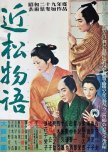
This review may contain spoilers
"People's fates take such strange turns"
Going into a film titled The Crucified Lovers, it was a safe bet that the romance was not going to be filled with sunshine and roses. Mizoguchi took the 17th century ideals of honor and tradition and tore them open exposing the hypocrisy and cruelty underneath.Osan was a young woman married to a man thirty years her senior. Ishun was a wealthy owner of the printing company that supplied the Imperial court with calendars. Mohei was Ishun's right hand man who was nearly worked to death in his job. Otama served the family and was the target of Ishun's unwanted nightly advances. Though Ishun offered Otama her own house, spent lavishly on court officials and loaned important people large sums of money, he was unwilling to spare what amounted to pocket change to Osan's brother to save the family home. His miserly short-sightedness and lecherous ways along with Osan's brother's spendthrift habits would bring down both families while blaming it on others.
When Osan and Mohei were caught together in a completely innocent situation, Ishun accused them of adultery and ordered Osan to kill herself. He planned to have Mohei arrested for stealing his seal. The situation played right into Ishun's plan to rid himself of Mohei who was Otama's love interest. Mohei escaped and Osan fled, incidentally meeting up later. After attempting to leave the area with men on their trail, they decided to commit suicide at a lake. When Mohei confessed his love for her, she returned it and decided to live. Much of the rest of the film played out like The Fugitive with the couple on the run, constantly being chased. They were turned away by family who feared culpability in their crimes. Ishun wanted the situation handled quietly so his business would not be ruined by scandal. What he didn't know was that his own traitorous worker was feeding information to his rival. After the couple was captured and refused to be parted everything came unraveled for the master printer. Not only did his rival revel in his downfall, but the many noblemen who owed copious amounts of money to him hastened his ruin. The lovers went to their doom hand in hand serenely smiling finally free from the cruel constraints of the world they lived in.
Mizoguchi framed much of the film in tight restrictive spaces. Only when the lovers committed to staying together in the mountains did the spaces open up freeing them to breathe. Kagawa Kyoko was ethereal as the traditional wife, Osan. As Osan was forced to live on the run, Kagawa showed her fear, despair, and then a love that lifted her spirits above their dire situation. Hasegawa Kazuo was 23 years older than Kagawa but was able to convey the loyalty to his master's family and his conflicted love for Osan as well.
The lovers were not only guilty of adultery but also crossing class lines which was a serious violation in and of itself. The hypocrisy that men could sleep with anyone they wanted while a woman caught in adultery was literally crucified if her husband didn't kill her first was brought to the fore. As the female servants reacted to two lovers being paraded to their deaths, they wondered what horrific crime they had committed to suffer one of the most awful deaths. They hadn't killed anyone. While Osan and Mohei were initially innocent, Ishun's activities were reprehensible from the start. Had Ishun been willing to pry his purse open for a family member and kept his hands to himself, this entire tragedy might have been avoided. No one seemed to care about Osan and Mohei's fate, compassion was far outweighed by a rigid class and social system that had no room for error when it came to misbehaving women.
The Crucified Lovers aka A Tale from Chikamatsu ran the gamut of emotions as Mizoguchi tackled social traditions and gender rules. Beautifully filmed and well-acted, the tragic story of two falsely accused people who briefly found love and happiness across class lines and on the run was a challenging but rewarding film to watch.
8/23/23
Was this review helpful to you?

Crouching Tiger, Hidden Dragon: Sword of Destiny
2 people found this review helpful
This review may contain spoilers
"All this for a sword"
Crouching Tiger, Hidden Dragon was epic storytelling and my highest rated wuxia. For this sequel without Ang Lee and being a Netflix release, I lowered my expectations and was not disappointed. Sword of Destiny was smaller in scope and storytelling, but still a fun movie. Yuen Woo Ping shot it like a more traditional wuxia, albeit with a bigger budget. More than that Michelle Yeoh and Donnie Yen reteamed again (loved them in Wing Chun!), and that was enough to make my martial arts loving heart beat with love.Yu Shu Lien thought long dead returns to mourn Sir Te and helps his son secure the legendary Green Destiny sword. The evil and ruthless Hades Dai, wants to rule the martial world and is determined to have the Green Destiny for himself. Silent Wolf, whose rumored death was greatly exaggerated puts together a team of five martial artists from the Iron Way to help protect the sword. Thrown into the battle is Snow Vase, a young martial artist who wants the sword to kill Hades Dai and Wei Fang, a young martial artist who works for Hades and has been tasked with stealing the famous sword. They have a connection that will draw them together all under the watchful eye of Shu Lien. While the warriors work together to keep the sword and each other safe, Shu Lien must decide if she can forgive Silent Wolf for his past mistakes.
The movie was only around ninety minutes long and relied heavily on Michelle Yeoh's and Donnie Yen's chemistry. The supporting characters were not given enough time to be fully developed on either the good guys' side or the bad guys', yet they were archetypes from the genre which gave the viewer a shorthand of what to expect from them-the lone warrior, loyal martial artists, a blind witch, ruthless evil fighters, etc. Snow Vase and Wei Fang were the young warriors who had to find their redemption and way along with a little flirting under the guidance of Shu Lien and Silent Wolf.
The fights were all well-choreographed which was to be expected by Yuen Woo Ping. Was there high-flying action? It was a wuxia, so you betcha! Whether it was Michelle fighting an ambush in the forest, Donnie nonchalantly taking out a gang of hotheads at a tavern, or a spectacularly filmed fight on a thawing frozen lake, they were all outstanding thanks to Michelle and Donnie's experience. Michelle still had a quickness and fluidity that made her captivating to watch. Donnie brought a playfulness and solemnity to his fights depending on the opponent. Watching these two veterans fight back-to-back brought me sheer joy. I loved that there was a tower for the final battle. It brought back memories of Cheng Pei Pei (Jade Fox) having to confront the bad guys with their tower in one of her old movies. And the ubiquitous outdoor tavern from many an old kung fu movie was the perfect setting for the audience to meet Silent Wolf and the Iron Way fighters.
Michelle Yeoh has a regal bearing and elegance that cannot be duplicated. Her expressive face and voice pull you into her character. Only she could make a line like "You will not find it there nor take it from here" believable. Much has been made of the movie being filmed in English and later dubbed with Mandarin. Selfishly, I'm happy it was. There was ferocious backlash over Michelle's accented Mandarin in the original. I tried watching the dubbed version of Sword of Destiny but the professional Mandarin voice actress sounded incredibly generic and flat, sapping all the energy and nuance out of Yeoh's performance. I find Michelle's voice acting essential to her performance and was relieved to hear it in the English version. Maybe it was the wig or makeup but Donnie has never looked better or more romantic than in this film. And as you would expect of him, he handled the fight scenes splendidly. Harry Shum gave a complex performance as the young warrior at a crossroads in his life. The weakest performance of the main characters was Natasha Liu Bordizzo as Snow Vase. This appeared to be her first role and it showed. Finally, Jason Scott Lee made for a sinister villain, even if he wasn't given much to do. This was a Chinese and Hollywood/Netflix amalgam, and an international one at that, with actors from Malaysia, Hong Kong, the USA, Australia, China, Korea, New Zealand, and Vietnam. How you feel about a multi-national cast in a kung fu staple may affect your viewing pleasure.
For me, I can look at this film as completely separate from the original. It was not a perfect film, but for the genre it was quite good, I've watched my share of terrible ones. It did take some time to alter my perception of it being in English and not Mandarin or Cantonese, which did take away the authentic feel to it. There was a bit of cheese in it, but the original had its share, too, most wuxias do. The cinematography was nice, fights were solid, the scenery was beautiful, the OST felt integral to the story, aside from that ugly green sword-the props, sets and costumes were excellent, and most of the acting was acceptable to exemplary. Most of all it entertained me. I have watched this film numerous times and still enjoy it upon each viewing. I'm able to watch Michelle Yeoh and Donnie Yen once again fighting side by side which makes this a winner in my book.
8/4/23
Was this review helpful to you?
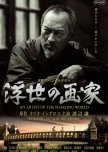
This review may contain spoilers
"The essence of cowardice"
The world of An Artist of the Floating World was built on sets with overly saturated colors like a series of beautiful paintings. The story began with an old man on the Bridge of Hesitation as he grappled with his memories, his place in the world, and regret. The only problem was that his memories were unreliable as he reached back into a fading past that still had the power to affect his present.Aging artist Ono Masuji began to flow in and out of memories when his youngest daughter Noriko was in marriage negotiations. Because the last negotiations fell through, his oldest daughter told him that she hoped he took "precautionary steps" in regards to the other family's investigations into theirs. His memories caused him to travel to the time when his father burned his paintings refusing to have an artist for a son which only made Ono's ambition burn brighter. He began working in a mass art production company and then for a master artist who specialized in the decadent "floating world" of the night and geishas. After the invasion of China, he entered the artistic world of propaganda.
Setsuko's cautionary words caused him to re-examine a chance meeting with the former prospective son-in-law that went deeper than his initial thoughts. A business owner involved with the war and a propagandistic composer both committed suicide, further stirring old feelings. He discovered the younger generation wanted men involved in imperialist Japan to admit their mistakes and take responsibility for the consequences of their actions on the people and country. He began to reflect on his past loyalty to the country through a new lens.
I have never read the book and can only hope it filled in a few of the gaps left in this film. There were times I wondered if I was watching something akin to A Beautiful Mind. Duplications of actions occurred with different characters, Ono's daughters were unaware of conversations he said they had, and his hallucinations made me wonder if some characters were real or personifications of his guilt. Was he never as important as he thought or had he faded into irrelevancy in the new world order quickly? The constant flow from the present to different points in the past could make for a dreamlike experience. If we had to have a guide in this fluid world it would be Ken Watanabe, he did an amazing job as a man who had to come to terms with a career that not only did not endure but went up in flames.
As if written in first person, Ono narrated the film but he was an undependable narrator who admitted he wasn't sure what he said or what others said. By seeing everything through his unreliable perspective, there was no touchstone to evaluate his comments, no opposing voice to guide to a greater grasp of the truth. In the end it was an interesting film about a country coming to terms with and also suppressing a militant past. The younger generation and those "traitors" who suffered for daring to question the war confronted the old guard and wanted an apology. "…now we clearly know who the real traitors were." Ono slowly began to recognize his responsibility in the collective suffering even if his memories, like this story, were ambiguous at best.
8/2/23
Was this review helpful to you?

This review may contain spoilers
Beware the mountain!
The Wrath of Daimajin was the third in a series of films starring the giant mountain god who restored balance. The film focused on four children attempting a rescue of their family members who had been coerced into working for an evil samurai. This was a far darker film than I anticipated given the nature of Kaiju films starring children in the 1960's.When the evil Arakawa kidnaps loggers from a small village, logger Sanpei escapes over the Majin mountain arriving home mortally wounded. He's able to tell the villagers that the rest of the men are being used as forced labor in Arakawa's sulphur mine in aptly named Hell's Valley. The village's lord isn't immediately concerned and fears snow may fall soon and doesn't send any help. Four boys decide to take matters into their own hands and runaway to rescue their loved ones. The only way to Hell's Valley is over the Majin mountain. Brothers Tsurukichi and his little brother Sugi, friends Kinta, and Daisaku bravely face the mountain everyone avoids due to the capricious mountain god who inhabits it. When they come upon the stone statue of the deity, they give proper homage before setting forth. The boys not only face natural dangers, but also three samurai ordered to hunt down Sanpei. Regardless of their young age, the samurai repeatedly attempt to kill the boys when they are discovered. Far from a romp in the woods, the boys pay a terrible cost for their adventure.
Meanwhile at the sulphur mine, the evil samurai shows why he's evil when he throws a thwarted escapee into the boiling sulphur lake. The brothers' father keeps hope alive that he will see his sons again. The villagers decide to go after the boys when they realize they are gone. When the parents arrive at the stone statue, it begins to bleed, and finally the titular character breaks forth when his hawk avatar is killed. At this point, the stomping begins as the mountain god stirs up a blinding snow storm to herald his arrival.
As I mentioned, this film was much darker than I had anticipated, going to a place most movies with children protagonists never would. Two likeable characters were killed and another attempted suicide to appease the god. There was a bloody hawk attack and a dangerous rafting trip on a swift river.
The fake snow actually looked good when Daimajin finally arrived. Kaiju usually show up by the 39:00-minute mark, this god couldn't be bothered until 65 minutes into the movie. The miniatures and fake scenery blended well with the real scenery. The shots of forests, mountain streams and lakes were quite lovely as the boys made their way across the scenic landscapes which belied the deadly forces at work. Arakawa's hideout near the mine was smaller than the large buildings Godzilla used to trounce through, but the more manageable size actually accented the stone warrior's terrifying force against the evil doers trapped in Hell's Valley.
The four child actors were a pleasant surprise, with natural but compelling performances. The adults all acquitted themselves well, too. The writing ultimately did exactly what we needed, Daimajin ruthlessly destroyed the evil forces, who were well deserving of his punishment. Whether the sacrifices of innocents gave a deeper emotional level to the film or were unnecessary will be up to the individual viewer to decide.
Wrath of Daimajin won't go down as one of the great monster movies but it was oddly satisfying. The god with a heart of stone didn't arrive in time to save important characters, or keep anyone from being injured but when he finally decided to restore balance he did so with a vengeance.
7/22/23
Was this review helpful to you?
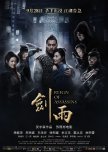
This review may contain spoilers
The window of opportunity has opened
Reign of Assassins is a good old-fashioned wuxia. Though lacking the artistic flair of Ang Lee and Zhang Yi Mou, it had more than enough exciting sword action and compelling acting to set it well above average. With assassins around every corner, hidden identities, and a little romance thrown in, ROA delivered.Very minor spoilers:
The Dark Stone gang murders an official and his son in order to possess the remains of legendary monk Bodhi which are rumored to make the one in possession of them the ruler of the martial world as well as the source to miraculous healing. One of the assassins, Shi Yu, escapes with the remains and goes on the run with most of the assassin world searching for her. A soon to be monk named Wisdom helps her hide and they fall in love. He also gives her valuable information about the weaknesses of her Water Shedding sword technique. From her experience with him, she determines to turn over a new leaf. She visits Dr. Li who gives her a new face and identity. The freshly named Zeng Jing sets up a shop in town and soon falls in love with the local courier, Jiang Ah Sheng. He's a kind-hearted, clumsy, gentle man who seemingly couldn't hurt a fly. But the course of true love never runs smoothly and soon The Dark Stone gang and other contenders for the remains arrive in town when her secret identity is revealed.
This film might not have worked as well if Michelle Yeoh had not played Zeng Jing. She gave a complexity to the role that made her magnetic to watch. She and Jung Woo Sung had nice chemistry together and made for a believable couple. The Dark Stone gang was comprised of an eclectic group of killers. The Wheel King wore an obvious fake moustache and had personal reasons for wanting the remains. There was also an older assassin who was a magician, an assassin who used darts and had a loving wife at home, and a promiscuous and blood lusting new recruit who had murdered her fiancé and his family. Director Su Chao Pin took his time developing the characters and their complicated relationships which gave greater stakes to the fights and more fire to the vengeful surprises as they unfolded.
The fight choreography was creative and highly entertaining. Swords tore through the air so quickly, the action could be hard to follow. Wire-fu was used without making it the focal point and there were no Matrix slow-motion moves too often overused in films. Michelle Yeoh as always convincingly displayed a graceful dexterity with weapons and a dancer's flexibility with her kung fu moves. Korean actor, Jung Woo Sung acquitted himself well when it came his time to participate in the action.
This film embodied the important aspects of a good wuxia-revenge, quality fights, a little romance, and a satisfying redemption arch. Most of all, Reign of Assassins featured a captivating female swordswoman who evolved as a character and was allowed to fight her own battles. Michelle Yeoh once again demonstrated why she is the queen of martial arts movies.
7/19/23
Was this review helpful to you?
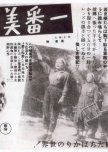
This review may contain spoilers
Kurosawa WWII propaganda film
In 1944 Kurosawa Akira made The Most Beautiful, a propaganda movie about women volunteering to make lenses used in the war machine. Heavily censored and primarily to boost morale, as most wartime propaganda films were/are, Kurosawa chose to show not only the commitment of the women involved but also the sacrifices they made with their families and their health.Director Watanabe, a young woman who calibrates lenses at the Hiratsuka factory, works with management and with the workers. When the women are given the order to increase production by 50% over the next four months, they are offended because the men were ordered to increase theirs by 100%. Watanabe convinces the company that the women can increase production by 67%. As the women boost their efforts, they are also called upon to create a drum and fife corp. Everyday they march down the street outside the factory. When production decreases they are told to do something fun and begin playing volleyball in their free time. As days drag on, fatigue begins to wear on their bodies and minds. Illnesses, a broken leg, and bickering take place. Despite the setbacks, all of the women who recover cheerfully return to once again do their part for the war effort. Watanabe sees their responsibility as critical to the men fighting, how even one defective lens could mean a man's death, and the man's death could lead to a loss for the military. Follows the old story "For want of a nail the shoe was lost, for want of a shoe the rider was lost…" She goes to obsessive lengths to make sure a lost uncalibrated lens is found. Even when a parent dies and the company says Watanabe should go home, she refuses, determined to continue the mission, grieving silently to herself later.
There were many propaganda signs hanging about. "Follow the example of the war dead." "Follow the example of Yamamoto." "Troops are in the enemy's sights." And the main director's advocation of "One can't improve productivity without improving one's character," was quoted often. Aside from the factory being populated by women, the "men" who also worked there in the ranks looked like boys. The management was made up of middle-aged men, but the workers seemed quite young.
Irie Takako played what amounted to a house mother, but a woman the young women admired and listened to. Yaguchi Yoko as Watanabe was the heart of the story as she struggled to motivate the women in her charge to work harder and also managed their personal problems and illnesses. Yaguchi would marry Kurosawa the next year. Shimura Takashi had a glorified guest role at the beginning of the film as the director of the factory. All of the supporting management characters were overly benevolent and compassionate as if to tell people it would be safe to send your daughters to work and live in these facilities.
Kurosawa was able to make a film as much about the dedication of the young women and the toll the work took on their bodies and minds as he did about their role benefiting the military and the country. At 85 minutes it felt much longer as there was only so much I could watch of people manufacturing lenses and hearing propaganda. The historical aspect of it was interesting but as a piece of art, not so much, though Kurosawa did what he could. If you're interested in old propaganda films or are a Kurosawa completionist, I fall into the latter category, it's worth checking out. Otherwise, it might be best to skip to One Wonderful Sunday or Drunken Angel.
7/18/23
Was this review helpful to you?

This review may contain spoilers
Pride or Justice?
This story reminded me of Ikiru when Watanabe tenaciously visited department after department each hidden behind a wall of red tape to get a park built. Qiu Ju, the title character, quietly, persistently confronted the ever-expanding layers of legal hierarchy to gain satisfaction after her husband was kicked in the chest and groin by the village chief over a supposed slight. All she wanted was for the stubborn chief to admit what he did was wrong and apologize which was something he refused to do.Poor farmers and living above the snowline, Qiu Ju sold much of their chili crop to have money for her trips to significantly larger towns as she implored officials to resolve her case satisfactorily. From the beginning each of the officials agreed that the chief needed to pay for her husband's medical bills and lost wages. Qiu Ju didn't want the money, she wanted an apology, but the chief managed to offend and belittle her at every encounter. The story began to feel repetitious as Qiu Ju and her sister-in-law traveled to the next city and next official in hopes of gaining justice.
Qiu Ju was the irresistible force and the chief was the immovable object, both stubborn and prideful. Qiu found out what many have before, that people in power rarely admit to wrongdoing and would rather hand over money instead of losing face. Near the end of the film as Qiu Ju gave birth and the chief was called upon to help because her life was in danger, the interconnectedness and interdependence of those living in the remote village came into clearer view. In the final scene, she was forced to weigh her actions when the consequences were doled out. The film finally scratched below the surface of Qiu Ju's journey. Perhaps in the end both learned a lesson in prideful actions and the importance of community.
Zhang Yi Mou is known for his gorgeous settings and color saturated scenery. This was a more beige film with the demarcation between snowy mountain village and urban city quite stark. The village could have been from 50+ years ago with the large wheel barrow carts, bicycles, and occasional motorized cart. The modern (1992) city in contrast was loud, crowded, and busy. The sisters-in-law stuck out with their simple clothes. ZYM filmed the crowds clandestinely, giving an authentic view of the bustling streets. Posters of both Chinese and American movie stars covered walls. It was interesting to see how the wheels of justice moved for those with the least power, but color me cynical at believing each layer of law enforcement justice would move as quickly, politely, and seriously for a peasant woman who in essence was only seeking an apology.
I've read this film is considered a comedy, but I failed to see it with the exception of one scene where Gong Li was told to buy new clothes so that she wouldn't be targeted by scammers. She ended up purchasing a large striped blazer which should have been considered more of a tragedy than comedy as it further hid her body and made her look even more like a gullible country bumpkin. Between the pregnancy pads and an enormous green scarf wrapped around her head it was hard to recognize her in some scenes. A close-up of Gong Li's beautiful face was not even used until the final shot. Despite having her face nearly obscured for much of the film, her charisma shone through as the uneducated, dutiful wife who despite her husband's protestations, would not let go of her need to hear from the chief that they had been wronged and it was not in his power to physically abuse her husband. There were only a handful of actors in the film, the rest were local people, much like in Not One Less. Liu Pei Qi represented well the patient long suffering husband who saw their store of peppers quickly dwindling as Qiu Ju monetized them in her quest for justice. The village though desperately cold was warm with human compassion as her husband's family and the chief's family all got along well and worked well with each other with the exception Qiu and the chief. Overall, it was a gentle law and order slice of life.
As an historical window into 1990's China, The Story of Qiu Ju was informative showing the busy market places and traffic and the snowy paths the neighbors' walked up the mountain to the little farming village. Viewing a Gong Li performance is always worthwhile. But in the pantheon of Zhang Yi Mou films, I found this one to be less than enthralling as Qiu traveled from city to city beseeching officials who repeatedly gave the same answers. There weren't any bad guys, with the exception of one con artist, the people Qiu met were polite and helpful. Even the chief came through when it counted. Qiu began to look more petulant and obsessed as the film went along. While I could appreciate Qiu Ju's quest for justice, at some point, much like the chief's stubbornness in not apologizing, it became a pyrrhic victory.
7/11/23
Was this review helpful to you?
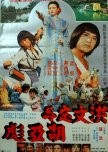
This review may contain spoilers
Toadily ridiculous!
The Guy with Secret Kung Fu looked like a lot of other cheap Taiwanese kung fu movies from this timeframe. Where this film won me over were the sound effects which truly had me laughing in many scenes whether that was the director's intention or not. They must have gotten a deal at Discount Sound Effects R Us and decided to use as many as possible.Once again, the plucky Ming rebels are fighting the Qings. This time not only must they deal with the hated dynasty but also Sally Chen's fearsome Dragon Gang! Brothers/blood brothers Hung Wei Ting (Mang Fei) and Hu Ah Piao (Li Chung Chien) take down a bunch of Chin Wan Che's brown shirts when the Dragon Gang attacks Elsa Yang and her father on a boat. The Dragon Queen is not happy when her men are beaten nor are the Qing officials. Wei Ting is captured in town and his brother has to break him out. When they slow down to help another escaped prisoner the boys are captured once again. Wang Hsieh as a Qing official lets them loose hoping they will take down the Dragon Gang. It makes less sense as it goes along, but it gives the boys plenty of opportunities to fight and take their shirts off and the girls to be attacked or kidnapped and need rescuing.
The story becomes more interesting when a sorcerer played by Shih Chung Tien brings to life a half-human/half-vampire demon with super strength played by perennial giant Cheng Fu Hung. None of the brothers' kung fu abilities have any effect on him. Fortunately, he tosses them through the wall of the coffin maker's shop thinking them dead and the daughter played by Nancy Yen takes a fancy to them. She just happens to have a secret kung fu book! Of course, she does! It details The Dragon Fist technique and also has a recipe for defeating the demon! Holy Deux ex machina Batman!
The final fights are loads of fun. Sally Chen and her tricked out poison dart thrower, the Sorcerer, and Wang Hsieh with his Toad style against the boys and their newly acquired Dragon Fist moves accompanied by some of the most ridiculous sound effects ever were exciting.
Despite the movie being a Hong Kong production, I knew immediately it was shot in Taiwan. Per usual, the film relied on outdoor scenery, especially the woods and a field of tall grass. The movie was also badly faded as many of them have not been restored. Taiwanese actors and actresses populated the movie-Mang Fei, Nancy Yen, Sally Chen, Wang Hsieh, Shih Chung Tien, and Elsa Yang.
The fights, especially, the first one on two boats and the last ones in the woods and tall grass were quite entertaining. Other fights varied but were a step above kung fu posing. Li Chung Chien appeared in less than 10 films but made a good partner for Mang Fei. Sally Chen was the most charismatic villain with her poison dart gun and glorious dresses. Elsa Yang starred in a number of ninja movies and would have made a good foil for her but aside from Sally, the rest of the female cast were relegated to screaming, "Help me! Help me!" Wang Hsieh's Toad style was hilarious as he blew out his belly and hopped about all while toad sound effects ribbeted in the background. The good guys did some super leaping themselves, mostly filmed in reverse.
Truly, the sound effects were the star of this film, many anachronistically so. Plane sounds when the boys jumped and were thrown about, gunshots for darts, fireworks swirling, frogs croaking, pew! pew! laser noises, and also the standard swish and clash kung fu sound effects. The "demon" sounded like the Tin Man needing more than a few drops of oil from his oil can. The movie itself was badly edited making it quite confusing as it jumped in time and from scene to scene leaving important bits out. The print I watched had been chopped to fit a screen somewhere in its past making me grateful it was dubbed. Otherwise, it might have fallen victim to the subtitles running off the screen or being illegible with the light background.
The Guy with Secret Kung Fu-actually it was Two Guys with Secret Kung Fu-was not a great kung fu flick nor did it have great kung fu, but it was toadily ridiculous and entertaining in its own comic way. Only for the most hard core of old kung fu film fans. As always, these pre-1990 cheap niche movies I grade on a curve.
7/6/23
Was this review helpful to you?
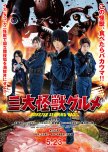
This review may contain spoilers
We're going to need a bigger boat---of butter!
Monster Seafood Wars could have been good campy fun if it had given me even one human to root for. I started out octo-mistic, but as it was, I was on Team Kaiju right up until near the end when a surprise hero came to the rescue and almost made the other 74 minutes worthwhile and I'm not squidding.As someone who has seen her share of Kaiju films, I'm prepared to go along with almost any convoluted storyline they want to hurl at me. This one started with Yuta taking his father's offering to the priest for the annual blessing at the shrine when he's knocked off his bike and his offerings of octopus, squid, and crab are stolen. They end up in the river with ominous bubbles floating over them and the next thing you know, the octopus and squid are ginormous and fighting each other in the city's skyline. The news media names them Takolla and Ikalla. Turns out Yuta had developed SETAP Z which causes animals to become huge. He was fired for going over budget and coincidentally his formula was also stolen. Yuta is hauled into the police station and interrogated by a SMAT (Seafood Monster Attack Team---seriously) commander and his childhood crush who works for the defense minister. He and his ex-work rival and rival for Nana, Hikoma, join SMAT to determine the best way to rid themselves of the seafood infestation. Hikoma has developed giant vinegar canons (I can't make this stuff up) that will spray the beasts and weaken them. It seems to work but then the giant crab, Kanilla, appears and lops off a few octopus and squid arms. Kanilla is unaffected by the vinegar attack and it's back to the drawing board for our heroes, and I use that term loosely. The positive thing that came out of the fight? Apparently, Kaiju meat is enormously delicious. Every restaurant in town tries to get their hands on the rare meat and patrons swamp to the select places that do carry it.
Monster Seafood Wars' writing was more damaging than a Kaiju romp around Tokyo. Yuta, Nana, and Hikoma acted like petulant 12-year-olds throughout the movie causing me to hope they ended up as steak tartare for the beasties. In a scene that harkened back to the sexist 70's, the two males made a bet that whoever won got Nana. Girl was sitting right there next to them while they were pounding their chests. Nana wasn't much better, other than saying derogatory things to Yuta and having expensive dinners with Hikoma, she didn't do much for someone with such a haughty attitude. The boys did nothing but fight and hurl insults at each other, refusing to work together even for the fate of the world. Go Team Kaiju! The only thing that turned this film around for me---spoiler alert--- was Yuta's buddy who unleashed a giant chef robot named Jumbo Cook near the end up the movie to carve the Kaiju into sushi. The last ten minutes were actually good campy fun.
This film was extremely low budget which wasn't a problem for me. I've watched a number of super cheap Kaiju movies and enjoyed them. The sets and props were about as low tech as it gets. The Kaiju looked more like the inflatable stick figures used at car dealerships than guys in rubber suits. Worst of all for me, the focus was almost entirely on the terrible three and their childish behavior. Listening to them bicker for nearly 86 minutes was more painful than whatever the squid with the big eyelashes could have hammered me with.
If you grew up watching Saturday morning children's tv shows with guys in monster or action costumes dancing about and bad acting this may give you a sense of nostalgia. But even the most stalwart seafood lover might find The Seafood Bowl nauseating. Far from being ex-squid-sit, it was clawful.
7/5/23
Was this review helpful to you?
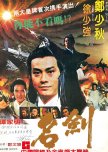
This review may contain spoilers
What price honor and glory?
The Sword asks the question, "what price honor and glory?" It's something I always wonder when I watch these films where swordsmen try to move up the pecking order by defeating someone ranked higher than themselves and toss the word honor around while doing it. "Excuse me, I know we don't have any disagreements, but would you mind terribly battling me to the death to see which of us is the superior swordsman?" This procedure never seemed very polite, much less honorable. In this film, Adam Cheng was forced to weigh the costs of spending years hunting for a legendary swordsman simply to test his skills.Adam Cheng as Li Mak Yin befriends Ying Chih, a young swordswoman being hunted by a kidnapper, on the road to finding Hua/Wah, the legendary swordsman who has gone into hiding. Along the way he runs into his old flame who grew tired of waiting while he was on his quest and married Lin Wan (Norman Chu). Lin Wan turns out to be a vicious brute who wants Hua's sword Hon Sing. When Ying Chih is finally kidnapped Li goes to help her and is gifted the cursed sword Chi Mud to aid him by a woman who saved his life after a fierce battle with Lin's henchman. Turns out Ying Chih is Hua's daughter. In a very awkward moment after returning the man's daughter, Li asks if they could duel. After that interlude, the bodies start stacking up.
For a 1980 martial arts film, The Sword was slow, melancholic, and artfully done. Director Patrick Tam used beautiful framing and compositions combined with dramatic lighting. 1980's synth music was utilized for the soundtrack which actually worked quite well for setting the mood. The film asked how it felt to get what you wanted. Were the costs in innocent lives worth a lifetime of trying to beat and be the best? For the lone swordsman was the emptiness and loneliness of the lifestyle a satisfying tradeoff to feed one's pride and ambition?
The stunt work and fight choreography were acrobatic and quick. Despite being a more thoughtful movie, it did have gruesome ends to some of the fights. There were not only the traditional impalements, but one person decapitated himself and another was split in half. Chi Mud, much like The Ring of Power, was infused with hate and malice, and considered an evil sword. And just like the ring, it orchestrated the deadly destiny of several lives.
Adam Cheng played the conflicted and ambitious swordsman well. As Li weighed some of his exploitive actions, his life goals began to change. Norman Chu can be counted on to give depth to a villainous character and he did. Tien Feng, often cast as a baddie, was sympathetic as the aging considerate swordsman who cared for those around him. Jade Hsu found just the right balance as the firebrand daughter. She was forced to act idiotic for a scene but the writers finally put Ying Chih back on the right path. Eddy Ko, in a mostly silent role, made for a frightening henchman. Overall, the acting was quite good, especially for the genre.
The Sword was an excellent martial arts film for 1980 in comparison to so many others made during this time. The scenery, settings, and costumes were of a higher quality than most. For those looking for non-stop action, this might be a disappointment because it takes its time developing Li's character arc and the stakes being played for. The movie ends on a mournful note as Li moves beyond what he has been taught about honor and begins to understand that the real world has real consequences for his prideful actions. I would definitely recommend this film for fans of the genre. As always, I rate pre-1990 niche dramas on a curve.
6/27/23
*Many sites use a copy and pasted synopsis that says a swordsman and a samurai team up to find a blade. There is no samurai in this film, my guess is that it's either for a different movie or someone wrote a synopsis who had never seen this film.
Was this review helpful to you?

This review may contain spoilers
"I don't understand"
The Three Swordsmen had an excellent cast-Andy Lau, Brigitte Lin, and Elvis Tsui as the titular swordsmen. And that's pretty much it. I have watched a number of old kung fu movies with convoluted plots, but this one took the cake. When a character made the comment, "I don't understand," I wanted to say, you and me both dude.Andy Lau played "Smiling Sam"/Siu Sam Siu one of the three best swordsmen in the country. He was tied with "Blade" Wham Dao (Elvis Tsui) whose skills had earned him a place commanding the military. Most perplexing was Brigitte Lin as Ming Kim/Ming Jian who was not cross-dressing but actually playing a married man with a child and dubbed with a man's voice. Siu was framed for theft, rape, and murder. And that's about as much as I can tell you. He steals a man's wife. Falls in love with someone else. Ming helps him out or so he says. Wham discerns that something else is afoot, but palace and other politics preclude him from investigating the case as he would wish.
The fights were ridiculously dreadful. The director enjoyed filming too close or at odd angles obscuring much of the action. Yuen Bun and Tony Leung Siu Hung could usually be counted on for entertaining fight choreography, not in this film. The wire work and light body super leaping were comically bad. There was an awkward duel in the trees and over water predating CTHD and Hero, but were a prime example of how valuable good direction and cinematography are. Siu had his Invisible Whirlwind technique which belonged on a Saturday morning kids' show. He could also decapitate and disarm opponents with his clothes. One woman like a white-haired witch could defeat opponents with her hair. She even paused during a fight to breast feed her child.
The film was not pleasing to look at, the framing and cinematography were subpar. The pacing was erratic. And seriously, why would they dub Brigitte Lin of all people with a man's voice? It didn't appear to be done satirically. You know a story is confusing when characters have to stop and repeatedly dump pages of complicated and baffling exposition on the audience. It also felt like half the cast was playing the movie for laughs, especially Lau. Lin and Tsui were deadly serious along with a few other characters. I wondered if two writers wrote different parts of the story separately and then tried to do a mash-up of them.
The Three Swordsmen could have been so bad it was good. I found it so bad as to be annoying. The only good thing about the movie is that it was only 86 minutes long.
6/26/23
Was this review helpful to you?

 37
37 113
113 7
7





















